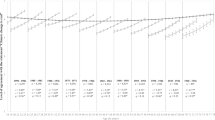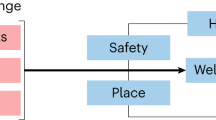Abstract
Climate change judgements can depend on whether today seems warmer or colder than usual, termed the local warming effect. Although previous research has demonstrated that this effect occurs, studies have yet to explain why or how temperature abnormalities influence global warming attitudes. A better understanding of the underlying psychology of this effect can help explain the public’s reaction to climate change and inform approaches used to communicate the phenomenon. Across five studies, we find evidence of attribute substitution, whereby individuals use less relevant but available information (for example, today’s temperature) in place of more diagnostic but less accessible information (for example, global climate change patterns) when making judgements. Moreover, we rule out alternative hypotheses involving climate change labelling and lay mental models. Ultimately, we show that present temperature abnormalities are given undue weight and lead to an overestimation of the frequency of similar past events, thereby increasing belief in and concern for global warming.
This is a preview of subscription content, access via your institution
Access options
Subscribe to this journal
Receive 12 print issues and online access
$209.00 per year
only $17.42 per issue
Buy this article
- Purchase on Springer Link
- Instant access to full article PDF
Prices may be subject to local taxes which are calculated during checkout




Similar content being viewed by others
References
Pielke, R. A. Policy history of the US global change research program: Part I. Administrative development. Glob. Environ. Change 10, 9–25 (2000).
Weber, E. U. & Johnson, E. J. Mindful judgment and decision making. Annu. Rev. Psychol. 60, 53–85 (2009).
Ungar, S. The rise and (relative) decline of global warming as a social problem. Soc. Quart. 33, 483–501 (1992).
Krosnick, J., Holbrook, A., Lowe, L. & Visser, P. The origins and consequences of democratic citizens’ policy agendas: A study of popular concern about global warming. Climatic Change 77, 7–43 (2006).
Egan, P. J. & Mullin, M. Turning personal experience into political attitudes: The effect of local weather on Americans’ perceptions about global warming. J. Pol. 74, 796–809 (2012).
Joireman, J. A., Barnes Truelove, H. & Duell, B. Effect of outdoor temperature, heat primes and anchoring on belief in global warming. J. Environ. Psychol. 30, 358–367 (2010).
Howe, P. D., Markowitz, E. M., Lee, T. M., Ko, C-Y & Leiserowitz, A. Global perceptions of local temperature change. Nature Clim. Change 3, 352–356 (2012).
Risen, J. L. & Critcher, C. R. Visceral fit: While in a visceral state, associated states of the world seem more likely. J. Pers. Soc. Psychol. 100, 777–793 (2011).
Tversky, A. & Kahneman, D. Availability: A heuristic for judging frequency and probability. Cogn. Psychol. 5, 207–232 (1973).
Weber, E. U., Shafir, S. & Blais, A-R. Predicting risk sensitivity in humans and lower animals: Risk as variance or coefficient of variation. Psychol. Rev. 111, 430–445 (2004).
Slovic, P., Finucane, M., Peters, E. & MacGregor, D. G. Rational actors or rational fools: Implications of the affect heuristic for behavioral economics. J. Socio-Econ. 31, 329–342 (2002).
Li, Y., Johnson, E. J. & Zaval, L. Local warming: Daily temperature change influences belief in global warming. Psychol. Sci. 22, 454–459 (2011).
Schwarz, N. & Oyserman, D. Asking questions about behavior: Cognition, communication, and questionnaire construction. Am. J. Eval. 22, 127–160 (2001).
Schuman, H. & Presser, S. Questions and Answers in Attitude Surveys: Experiments on Question Form, Wording, and Context (SAGE Publications, 1996).
Tversky, A. & Kahneman, D. The framing of decisions and the psychology of choice. Science 211, 453–458 (1981).
Hardisty, D. J., Johnson, E. J. & Weber, E. U. A dirty word or a dirty world? Attribute framing, political affiliation, and Query theory. Psychol. Sci. 21, 86–92 (2010).
Gilovich, T., Griffin, D. & Kahneman, D. Heuristics and Biases: The Psychology of Intuitive Judgment (Cambridge Univ. Press, 2002).
Kahneman, D. & Frederick, S. in Heuristics and Biases (eds Gilovich, T., Griffin, D. & Kahneman, D.) 49–81 (Cambridge Univ. Press, 2002).
Leiserowitz, A. American risk perceptions: Is climate change dangerous? Risk Anal. 25, 1433–1442 (2005).
Whitmarsh, L. What’s in a name? Commonalities and differences in public understanding of climate change and ‘global warming. Public Underst. Sci. 18, 401–420 (2009).
Payne, S. L. The Art of Asking Questions (Princeton Univ. Press, 1951).
Solomon, S. et al. (eds) in Climate Change 2007: The Physical Science Basis (IPCC, Cambridge Univ. Press, 2007).
Kahneman, D. & Tversky, A. Prospect theory—analysis of decision under risk. Econometrica 47, 263–291 (1979).
Williams, L. E. & Bargh, J. A. Experiencing physical warmth promotes interpersonal warmth. Science 322, 606–607 (2008).
Ijzerman, H. & Semin, G. R. The thermometer of social relations: Mapping social proximity on temperature. Psychol. Sci. 20, 1214–1220 (2009).
Mauss, I. B., Cook, C. L. & Gross, J. J. Automatic emotion regulation during anger provocation. J. Exp. Soc. Psychol. 43, 698–711 (2007).
Weber, E. U. Psychology: Seeing is believing. Nature Clim. Change 3, 312–313 (2013).
Francis, J. A. & Vavrus, S. J. Evidence linking Arctic amplification to extreme weather in mid-latitudes. Geophys. Res. Lett. 39, 1–6 (2012).
Buhrmester, M., Kwang, T. & Gosling, S. D. Amazon’s Mechanical Turk. Perspect. Psychol. Sci. 6, 3–5 (2011).
Leiserowitz, A., Shome, D., Marx, S., Hammer, S. & Broad, K. The New York Global Warming Survey (Yale Project on Climate Change, A Columbia University/Yale University Poll, 2008).
Bargh, J. A., Gollwitzer, P. M., Lee-Chai, A., Barndollar, K. & Trötschel, R. The automated will: Nonconscious activation and pursuit of behavioral goals. J. Pers. Soc. Psychol. 81, 1014–1027 (2001).
Acknowledgements
This research has been supported by the NIA grant 5R01AG027934 and the NSF IGERT grant 0903551. We thank members of the Preferences as Memories Lab, the Center for Research on Environmental Decisions, J. Logg, T. Higgins, Y. Li and A. Gneezy for helpful comments; J. Westfall, C. Kim and S. Baum for technical support in running the studies; and M. Sisco and N. Lowhim for research assistance.
Author information
Authors and Affiliations
Contributions
L.Z. and E.A.K. designed studies 1 and 3b. L.Z., E.A.K. and E.U.W. designed studies 2, 3a and 4. L.Z. and E.A.K. analysed the data. All authors contributed to writing the manuscript. E.U.W. and E.J.J. supervised the project.
Corresponding author
Ethics declarations
Competing interests
The authors declare no competing financial interests.
Supplementary information
Rights and permissions
About this article
Cite this article
Zaval, L., Keenan, E., Johnson, E. et al. How warm days increase belief in global warming. Nature Clim Change 4, 143–147 (2014). https://doi.org/10.1038/nclimate2093
Received:
Accepted:
Published:
Issue Date:
DOI: https://doi.org/10.1038/nclimate2093
This article is cited by
-
Globally representative evidence on the actual and perceived support for climate action
Nature Climate Change (2024)
-
Participating in a climate prediction market increases concern about global warming
Nature Climate Change (2023)
-
Record-breaking heat days disproportionately influence heat perceptions
Scientific Reports (2023)
-
Do Flood and Heatwave Experiences Shape Climate Opinion? Causal Evidence from Flooding and Heatwaves in England and Wales
Environmental and Resource Economics (2023)
-
Drought Exposure and Accuracy: Motivated Reasoning in Climate Change Beliefs
Environmental and Resource Economics (2023)



